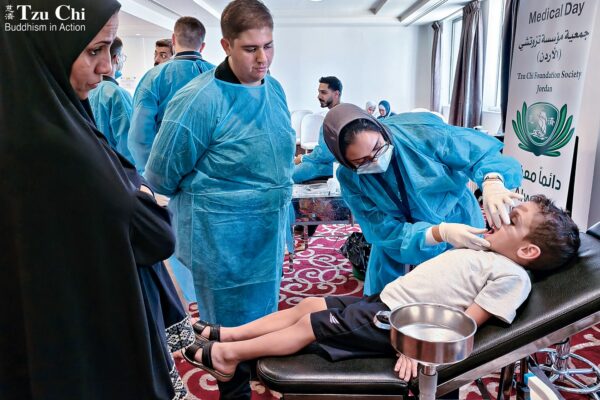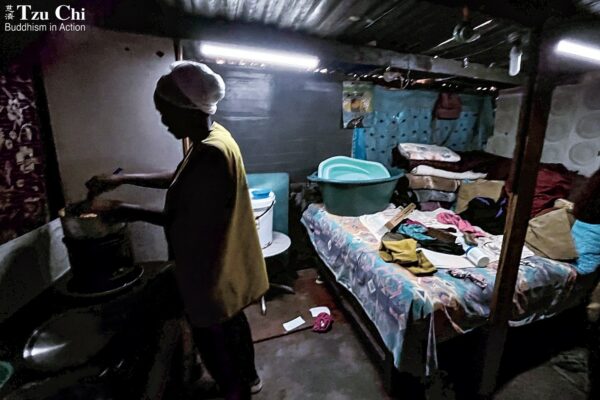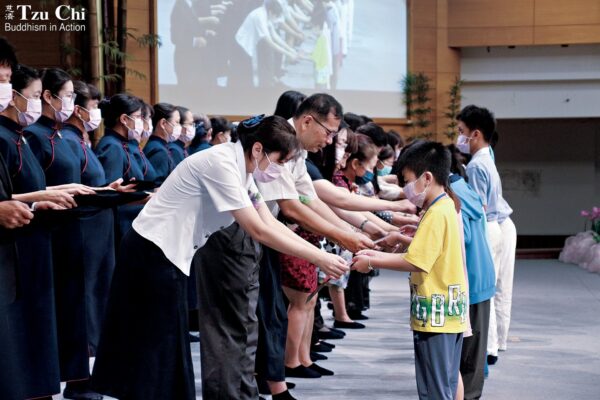The earthquakes that jolted Türkiye and Syria in February resulted in a vast swath of devastation, impacting an area three times the size of Taiwan. Tzu Chi volunteers saw either collapsed buildings or rubble being cleared when they visited heavily hit zones. Finding a safe place for large-scale distributions was almost impossible. Despite the challenges, the Tzu Chi team, feeling for the plight of the survivors, worked hard to overcome all obstacles and accelerated their efforts to provide relief.
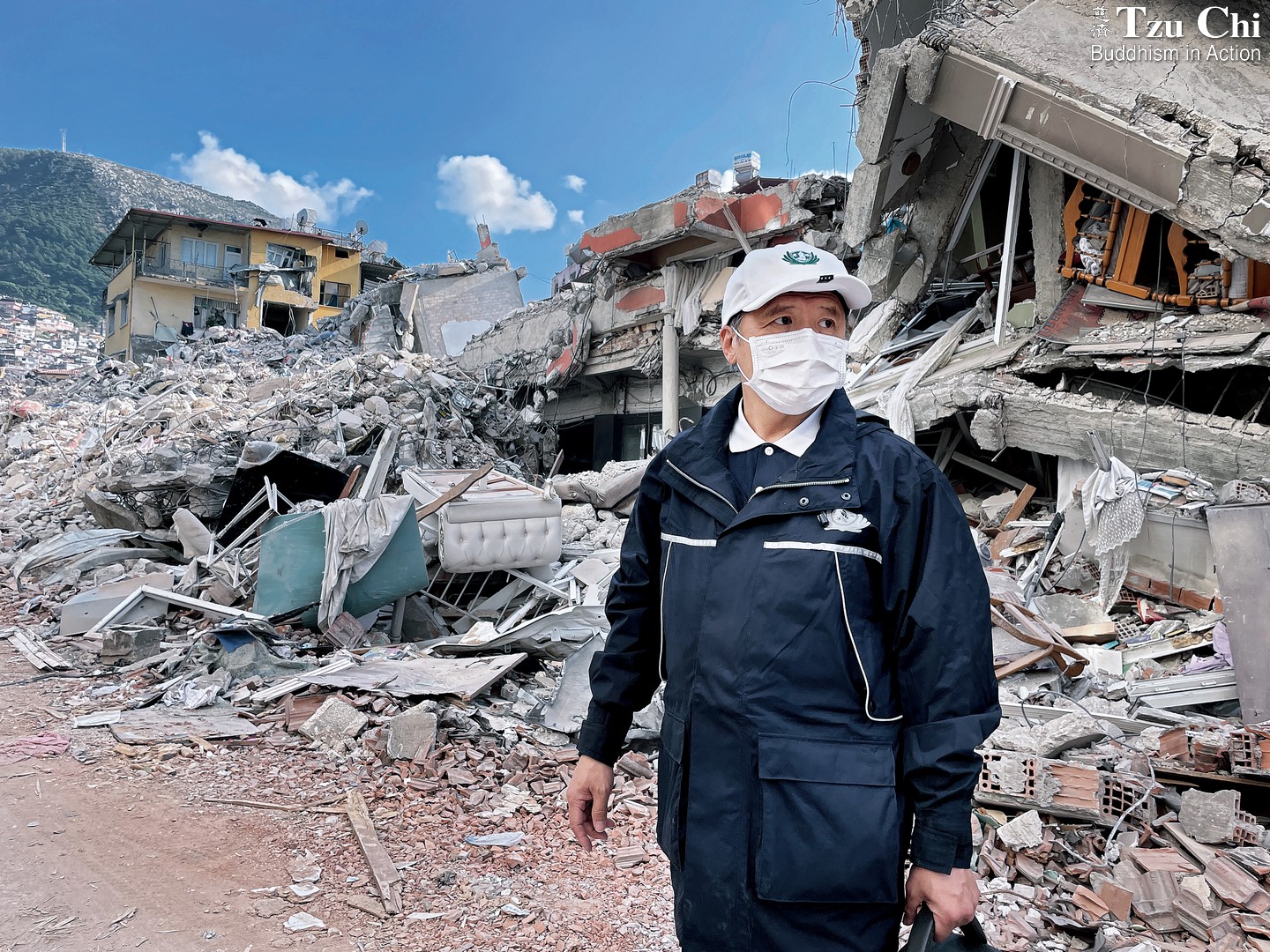
A Tzu Chi relief delegation witnessed severe devastation in southern Türkiye. The foundation completed the emergency phase of its relief efforts by the end of March, providing assistance in the form of gift cards and other aid to nearly 39,000 affected households.
JESSICA YANG
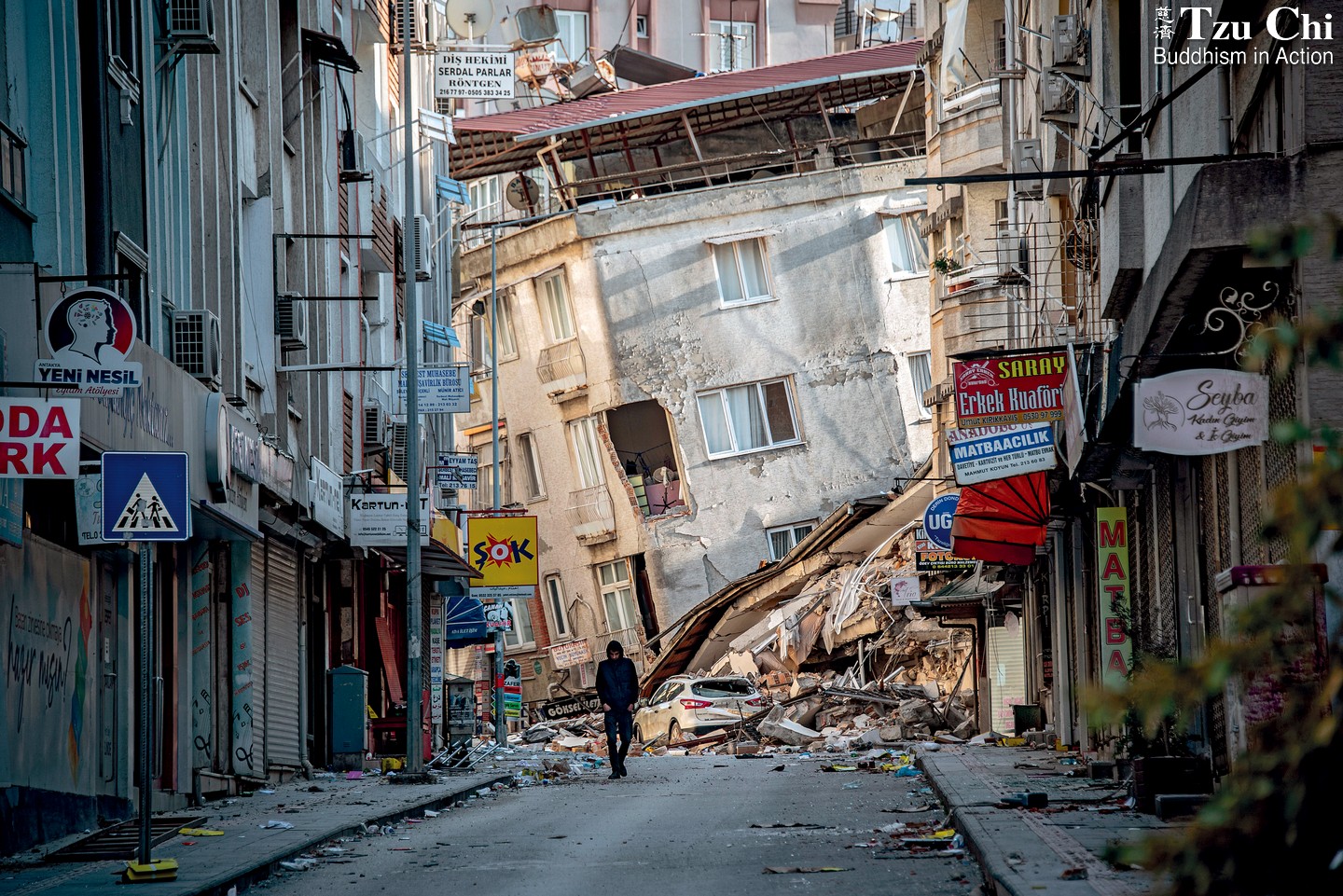
Clockwise : The ancient city of Antakya, Hatay Province, lies almost completely in ruins after the strong quakes (photo courtesy of TPG Images); quake survivors mourn their loved ones in a cemetery in the province of Kahramanmaraş (photo courtesy of TPG Images). The two main quakes and strong aftershocks killed over 50,000 people in Türkiye and Syria; after receiving aid from Tzu Chi, a woman from the town of Nurdağı, Gaziantep Province, took volunteers back to her home to take a look. Her house and tailoring shop had been reduced to rubble. “This place broke my heart,” she said through her tears (photo by Jessica Yang)
Life After the Quakes
By Yeh Tzu-hao
Translated by Wu Hsiao-ting
Photo courtesy of TPG Images
Survivors were beginning to take steps into a better future as they transitioned from tents to shipping container homes, at the same time that plans for permanent housing were beginning to take shape.
A post-quake cleanup effort was underway in the town of Nurdaği, Gaziantep Province. Excavator and truck operators were hard at work clearing and transporting debris from collapsed buildings. Afterwards, the ground was leveled in preparation for sturdy shelters. The dust resulting from all the work worsened the air quality, but a new atmosphere emerged as shipping container homes were brought in, giving rise to small settlements.
In addition to housing, community service facilities were established to support the affected population. These facilities included children’s playrooms, kindergartens, elementary and secondary school classrooms, adult Koran classes, counseling rooms, and administrative departments. There was even a beauty salon in front of which a group of soldiers who had come to help the victims patiently waited in line for haircuts.
The devastation caused by the February quakes in the town was immense. About 5,000 buildings were destroyed or severely damaged, accounting for over 80 percent of the town’s structures. The quakes had rendered over 40,000 residents homeless and tragically claimed more than 3,300 lives.
Despite the devastation, residents began to restore order and reestablish their daily routines less than a month after the tremors. Foreign-donated or domestically made container houses were gradually brought in as families moved in, one-by-one. The new homes were filled with items donated by the government or private sectors, including dry food, blankets, carpets, sofa beds, and televisions. But most importantly, private bathrooms were available in the new homes.
After the overwhelming tremors, charitable organizations from all over the world, including Tzu Chi, arrived in the disaster areas to assist. Approximately 1.4 million people in Türkiye had lost their homes due to the tremors. Most buildings in the disaster areas were either destroyed or deemed unsafe for habitation, forcing the majority of people to take shelter in tents. When Tzu Chi volunteers assessed damage in hard-hit areas in Hatay and Gaziantep provinces in mid-February, volunteer Nadya Chou (周如意), who lives in Türkiye, observed that “one of the foremost challenges faced by residents in the tent areas is the inconvenience of accessing water and the need to rely on public bathrooms.”
As of early March, there were still 332 government-run shelters open. Every tented area followed a “one family, one tent” principle. The tents were equipped with heaters and chimneys, and although not as warm as regular houses, they provided much better shelter than being exposed to the elements. Solar panels had been installed in the tented areas to provide basic lighting and power for portable devices, while temporary base stations set up by telecommunications companies met residents’ basic communication needs. However, residents faced significant challenges related to water and sanitation. In response, the government worked hard to construct shipping container houses and facilitate residents’ relocation, while also planning for permanent housing options to be ready one year onward. The government planned to offer interest-free loans for permanent housing for ten years to affected households, providing an opportunity for everyone to rebuild their lives in the aftermath of the tremors.
“After the quakes, I had nothing left and didn’t know what to do,” Mehmet Kurt, a resident of Nurdağı, told Tzu Chi volunteers when they visited the town in early March to distribute aid to survivors. “I spent my days wandering between my collapsed house and the tent I’m sheltering in, feeling sad and lonely. It wasn’t until you came today that I had someone to talk to. Your coming here is the best gift for me.” With help from different sectors, survivors are feeling hope come back into their lives.
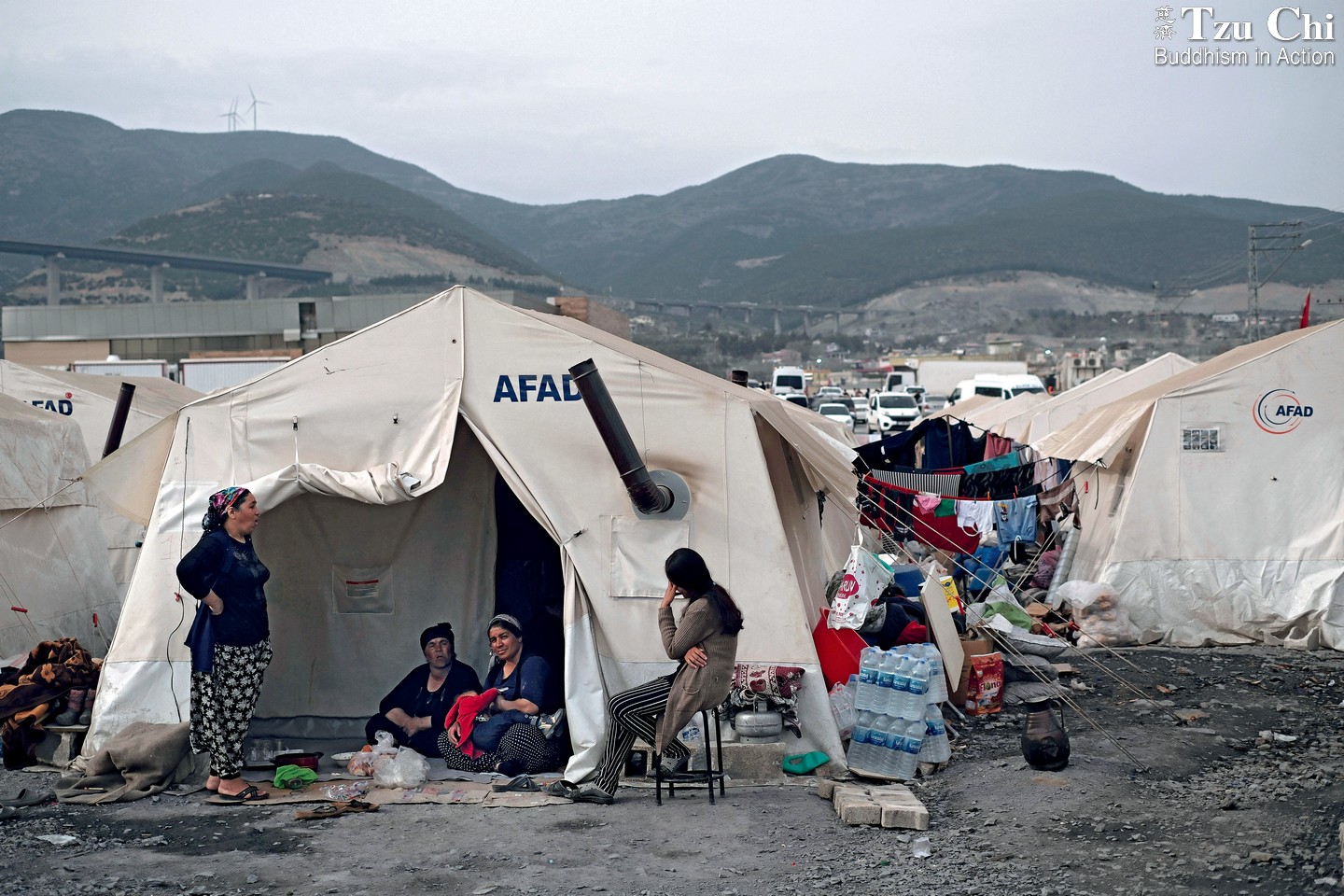
Residents of Nurdağı, in Gaziantep Province, southern Türkiye, take temporary shelter in a tented area set up by the government after the earthquakes in February.
Wrapped in Warmth
By Yeh Tzu-hao
Translated by Wu Hsiao-ting
Photo courtesy of Tzu Chi volunteers in Türkiye
Quake survivors in Türkiye faced dire challenges during freezing nights with temperatures plummeting to -10°C. Tzu Chi acted quickly, donating blankets from Taiwan and locally purchasing additional blankets for distribution.
In response to the earthquakes in Türkiye and Syria, Tzu Chi included blankets as crucial aid items in their emergency relief efforts. Numerous people lost their homes and heating in the temblors, with temperatures plunging to below -10°C (14°F) in some of the hard-hit areas. A large, thick blanket not only provided warmth, but could also potentially save lives for those who were forced to endure harsh conditions without proper shelter.
Tzu Chi wanted to ensure the timely distribution of blankets to those in need, so they swiftly prepared 8,000 extra-thick blankets from the stockpile of more than 30,000 blankets at Tzu Chi’s Neihu office in Taipei. In addition to providing insulation and warmth, these blankets conveyed heartfelt blessings to the recipients.
“These blankets have a special significance,” explained Faisal Hu (胡光中), a Tzu Chi volunteer in Türkiye. “They are not just any blankets that can be purchased in Türkiye. They are eco-blankets made from used PET bottles collected by our recycling volunteers in Taiwan, symbolizing their love for the Earth and their desire to bring warmth to those in need.” He emphasized the heartfelt effort made to provide these blankets from Taiwan to quake-stricken areas in Türkiye, and volunteers’ sincere expectation to personally distribute them to survivors.
Despite wanting to distribute the blankets directly to survivors, the over 8,000 eco-blankets donated by Tzu Chi were ultimately distributed by the Turkish government instead of Tzu Chi volunteers. This was due to the urgent need for post-disaster assistance and a directive issued immediately after the earthquakes by the Turkish government to have the country’s Disaster and Emergency Management Presidency coordinate the importation and distribution of foreign relief supplies.
In addition to the 8,000 eco-blankets, Tzu Chi purchased blankets locally in Türkiye for emergency distributions. Notably, the first recipients of the blankets were a search and rescue team from Taiwan, who were in Türkiye after the quakes to help rescue survivors.
“The blankets from Tzu Chi arrived just in time,” said Xu Qiao-sheng (許僑聲) from the search and rescue team. He explained that he was no stranger to harsh weather conditions, having participated in earthquake rescue missions in Iran and Japan before, but none he had encountered were as challenging as those in the quake-stricken areas of Türkiye. “When our team members touched the blankets donated by Tzu Chi, everyone was thrilled. We thought, ‘We finally have something to keep us warmer when we rest.’” Jin Guo-wang (金國旺), another member of the rescue team, said that when their search and rescue mission ended, their team donated the blankets to local residents so that they could be put to more good use.
Tzu Chi procured over 30,000 blankets in Türkiye to distribute in Istanbul and the provinces of Hatay and Gaziantep. At the Taiwan-Reyhanli Center for World Citizens in Reyhanli, Hatay Province, which was serving as a shelter for earthquake survivors after the tremors, a Syrian woman temporarily put aside her earthquake-related anxieties and wrapped herself and her family in three thick blankets provided by Tzu Chi, warming their bodies and hearts. Each blanket was a small but meaningful gesture that brought a glimmer of hope amidst the difficult circumstances faced by earthquake survivors.
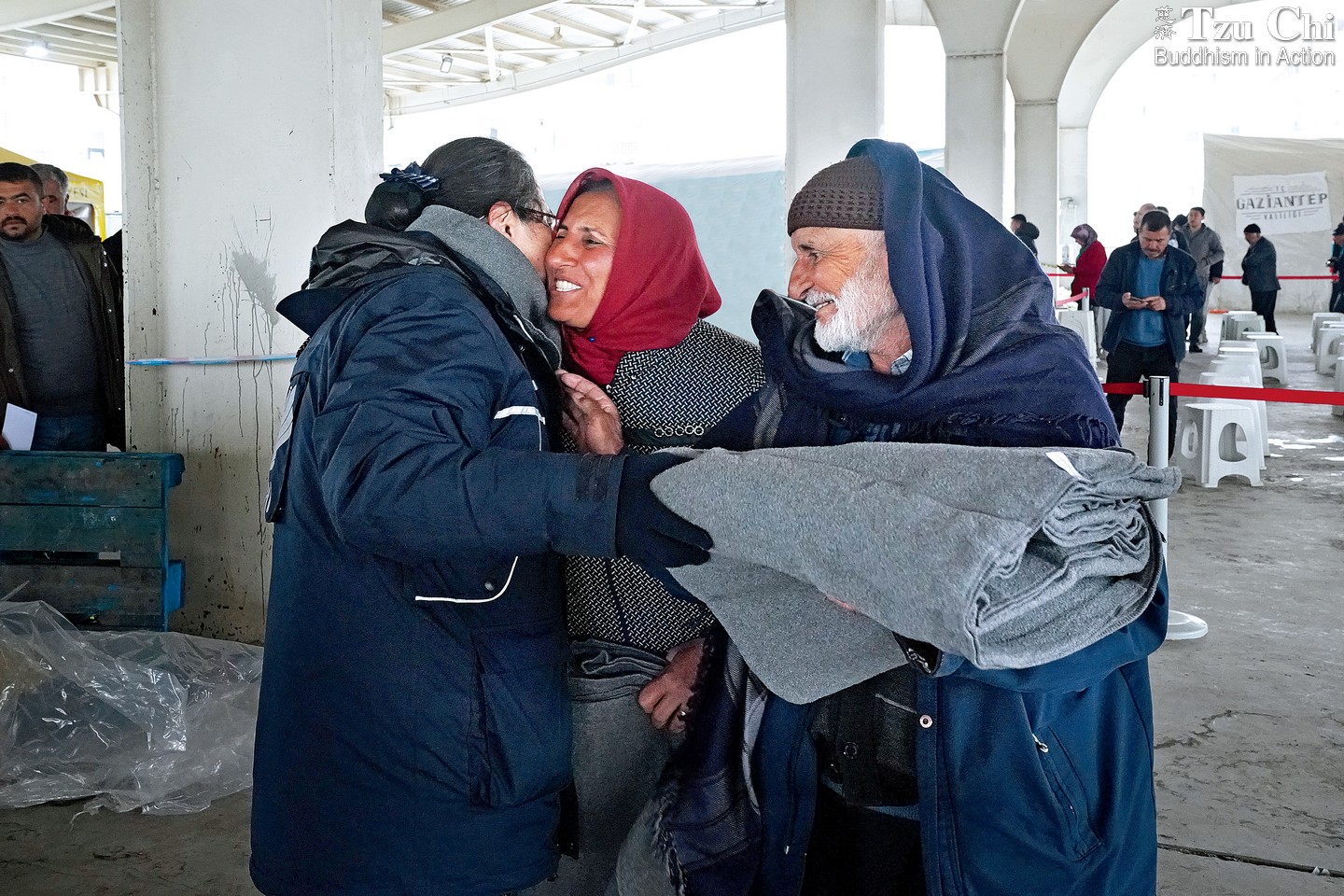
Tzu Chi volunteers in Türkiye distribute Tzu Chi’s signature eco-blankets to earthquake survivors in the town of Nurdağı, Gaziantep Province.
The Priceless Gift of Love
By Yeh Tzu-hao
Translated by Wu Hsiao-ting
Photo by Mohammed Nimr AlJamal
Earthquake survivors can use the gift cards from Tzu Chi at a designated supermarket chain to purchase what they need, providing them with some relief after losing all they had to the temblors.
Necati, in his 40s, is a resident of Şahinbey in Gaziantep Province and a father of five children. He had just returned home from a Tzu Chi distribution and couldn’t wait to share with his family the generous gift he had received there: five gift cards. These cards would be a significant help for his family, offering temporary relief from their economic burden. “I thought we would only receive some food and clothes,” he exclaimed. “I never expected such substantial assistance. We’re stunned!”
With the advancement of digital technology and the widespread availability of chain stores and supermarkets, the conventional method of physically distributing large quantities of relief supplies, which requires recipients to carry heavy loads, is no longer the only viable option when it comes to helping the needy. After the February earthquakes in Türkiye, Tzu Chi collaborated with a local chain retailer to offer stored-value gift cards to beneficiaries, enabling them to procure their needed items at designated stores.
“Many residents lost their homes and belongings in the earthquakes and were left with nothing. Our gift cards are practical. They can meet the various needs of survivors, including for formula milk and diapers,” said Tzu Chi volunteer Nadya Chou. She explained that the number of gift cards given to each beneficiary household varied depending on the size of the family, ranging from four to six cards. Each card was loaded with 2,000 Turkish lira (US$103), making the total amount received by each household equivalent to 410 to 620 U.S. dollars.
In 2023, the basic monthly salary in Türkiye was increased to 8,500 lira (US$412), so the value of the gift cards from Tzu Chi was quite significant for the disaster victims. However, there seemed to be a catch. With buildings in the heavily affected areas, including supermarkets, reduced to rubble, where was there to shop?
“Some recipients arranged for carpooling to other cities to make purchases,” explained Chou. She added that some people sought refuge in unaffected areas with relatives, where they could also use their gift cards for purchases, except for tobacco and alcohol, which were restricted. The supermarket chain in partnership with Tzu Chi also dispatched trucks to transport supplies into the disaster areas, allowing people to shop with their cards.
Generous donations from around the world, including money raised by Tzu Chi volunteers on the streets of Taiwan, funded the gift cards distributed to those affected. Footage of people making donations was played at the distribution venues, accompanied by the Turkish version of the Tzu Chi song “One Family,” moving many participants to tears. Yilmaz, a quake survivor, rushed to the stage at one distribution and embraced the volunteers, overcome with emotion. He said, “I can sense that our hearts are connected through your eyes. In this painful and challenging time, with so many of you here for us, I’ve let go of my sorrow and sadness.”
Volunteer Faisal Hu remarked, “The earthquakes have impacted both the rich and poor, and they all require assistance. The gifts we are offering today may not compare to what they have lost, but I believe they can sense the love we’re conveying to them.”
Syrian Refugees Give Back
By Yeh Tzu-hao
Translated by Wu Hsiao-ting
Photo by Jessica Yang
Syrian refugees volunteered in Tzu Chi’s earthquake relief efforts as a gesture of gratitude towards Türkiye for providing them with refuge. They became a key force in Tzu Chi’s disaster relief operations.
In 2014, three years into Syria’s civil war, Ahmad Jned’s father arranged for him to flee unaccompanied from Syria to Türkiye. Jned was a high school student at the time and brought with him more than 20 books. But despite his passion for learning, he didn’t return to school. Instead, he worked in a shoe factory to earn money to get his parents and younger brother out of his home country. Working 12 hours a day, he managed to save around 500 U.S. dollars over four months and successfully brought his family to Sultangazi, Istanbul. There, he and his family became long-term recipients of aid from Tzu Chi.
In November 2017, Jned left the shoe factory and returned to school. He became the oldest student at El Menahil International School, established in Türkiye by Tzu Chi for Syrian refugee children. “I have a notebook where I record all the aid amounts my family has received from Tzu Chi,” he said to Tzu Chi volunteers when he was admitted to Istanbul University in 2020. “By the grace of Allah, one day I hope to repay the money and allow the foundation to help more people.”
After the quakes in southern Türkiye, Jned prayed to Allah, saying: “Please allow me to go to the disaster area and help.” His proficiency in Turkish, Arabic, and English made him an invaluable member of Tzu Chi’s disaster relief team. He was filled with great excitement to work alongside Tzu Chi volunteers and contribute.
The young man shared that thanks to the volunteer training he received from Tzu Chi over the past few years, he learned how to compile recipient rosters and distribute aid. “With a deep understanding of Tzu Chi’s humanitarian values, I not only served as an interpreter in the disaster area, but also conveyed to government officials the foundation’s guidelines and practices for disaster relief, as well as the love that stems from the belief that ‘we are one family.’”
Jned expressed his gratitude during a videoconference between the Tzu Chi disaster relief team and the foundation’s headquarters in Taiwan, saying, “I’m thankful to Allah. In the past five years, I was the one who needed help, but today I have the opportunity to contribute as a member of the disaster relief team on the front lines. I’m also deeply grateful to Dharma Master Cheng Yen and Tzu Chi volunteers around the world for giving me this opportunity to serve. Together with the other Syrian volunteers, I’ll share the love of everyone with earthquake victims and spread it on behalf of Tzu Chi and Syria.”
All the teachers and students at El Menahil International School are Syrian refugees. After they learned about the powerful temblors that occurred at the border between Türkiye and Syria, they, along with graduates of the school, volunteered to provide assistance to survivors. In late February, the first group of 40 teachers, students, and graduates traveled over a thousand kilometers (620 miles) to the disaster area to help. Some teachers and students even transported tables, chairs, and computers from Istanbul to the town of Nurdağı when Tzu Chi was holding large-scale distributions there in early March. Their actions helped ensure smooth distributions.
Volunteer Nadya Chou was profoundly touched when she saw the teachers, students, and graduates giving back to Türkiye, the country that had provided shelter to them after the civil war erupted in Syria. She said, “They are determined to successfully accomplish the mission.” Without a doubt, they have become a powerful force in Tzu Chi’s earthquake relief efforts.
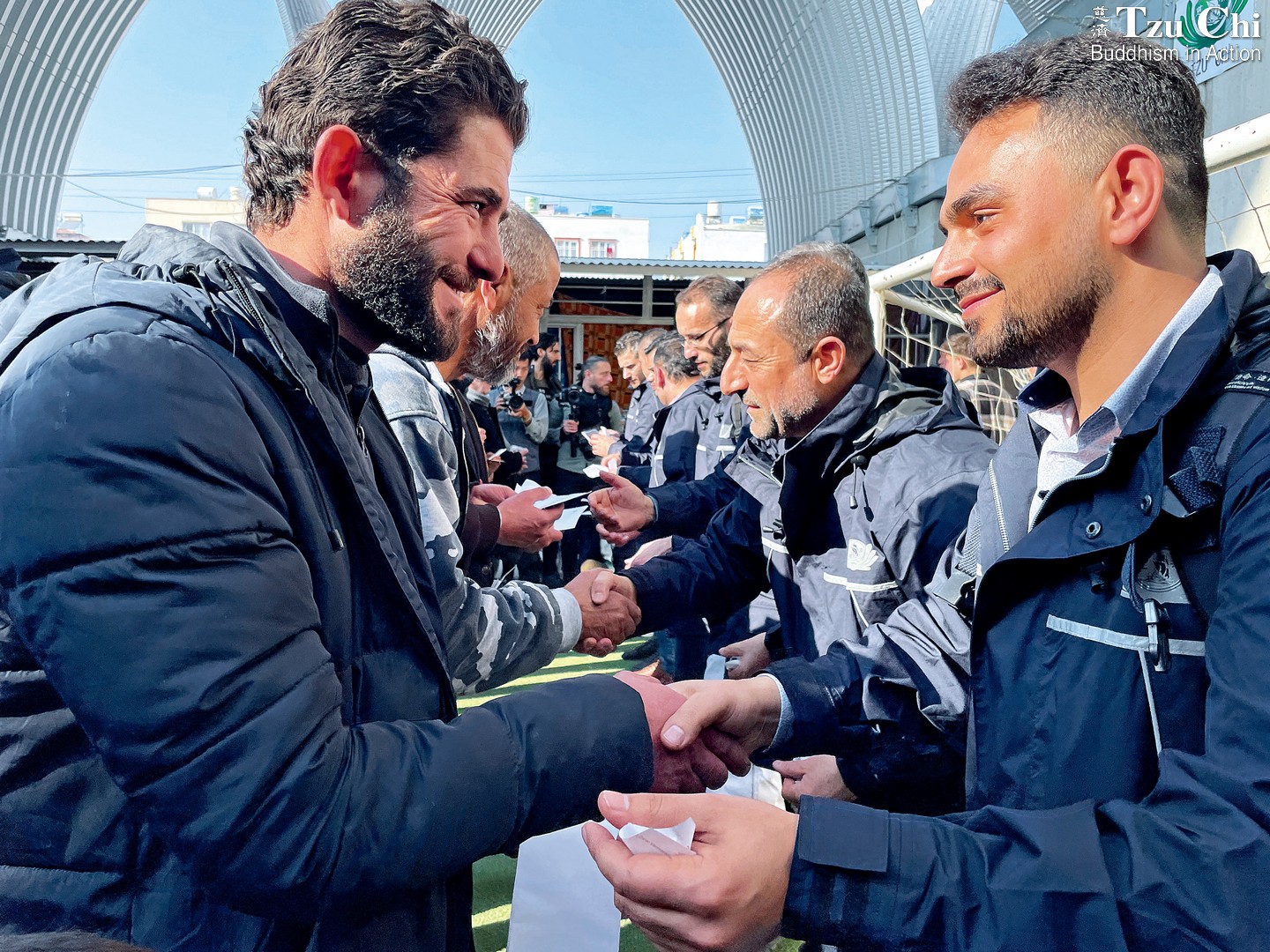
On February 25, Tzu Chi held its first distribution in the quake zone at the Taiwan-Reyhanli Center for World Citizens in Reyhanli, Hatay Province. Pictured on the right is Ahmad Jned, shaking hands with a quake survivor after presenting him with gift cards and a consolation letter from Master Cheng Yen.
This Road Leads to Syria
By Yeh Tzu-hao
Translated by Wu Hsiao-ting
Photo by Mohammad Fayoume
With collaboration from a Jordanian humanitarian organization and assistance from the military and the United Nations, Tzu Chi Jordan successfully got aid from the foundation into the quake zone in Syria.
The earthquakes in Türkiye and Syria displaced over a million people and impacted an area of over 100,000 square kilometers (38,610 square miles). Tzu Chi volunteers in Jordan, Syria’s southern neighbor, took action after the disasters to get aid into Syria despite the Syrian government’s restrictions on international humanitarian organizations entering the disaster zone. The volunteers’ efforts bore fruit in March, when relief supplies from the foundation were successfully delivered to the quake zone in northern Syria. This marked Tzu Chi’s first-ever assistance to the local population since the Syrian civil war broke out in 2011.
Chen Chiou Hwa (陳秋華), the head of Tzu Chi Jordan, explained how the foundation was able to help quake survivors in Syria this time. He said that King Abdullah II bin Al Hussein of Jordan directed Ayman Safadi, the country’s Minister of Foreign Affairs, to travel to Syria after the quakes to coordinate with President Bashar Hafez al-Assad for the delivery of aid from Jordan to Syria. The two sides reached an agreement, allowing Jordan to send aid supplies to the Syrian disaster area from February to August of this year. Chen explained that the Jordan Hashemite Charity Organization (JHCO), founded by Prince El Hassan bin Talal of Jordan, was entrusted by King Abdullah II to oversee the relief efforts. JHCO has a long history of international disaster relief, with extensive connections and experience. This earned them the trust of both the Syrian government and opposition forces, enabling them to facilitate the aid operations.
Upon learning that Tzu Chi could send aid to Syria with the help of JHCO, Chen and other volunteers in Jordan promptly prepared over 10,000 jackets, hats, gloves, and other similar items to be delivered to the country. Huang Da-gong (黃大功), a Taiwanese businessman in Jordan, also generously agreed to donate 430,000 articles of winter clothes and 50,000 blankets, while his factory staff worked tirelessly to produce them.
According to Chen, “The Syrian government ensured that all supplies would be delivered directly to the areas affected by the quakes. I also communicated with JHCO, emphasizing there had to be no discrimination—aid should be provided to affected households, whether they were in areas controlled by the government or by the opposition.”
In late February, the first batch of goods was transported to a JHCO warehouse in Mafraq and then carried by military trucks to the Jabir border crossing. The supplies were temporarily stored at a border warehouse before being loaded onto United Nations-leased vehicles to be transported into Syria. They were eventually delivered to hard-hit areas such as Idlib and Aleppo, to be distributed to survivors by the United Nations.
Many Syrian refugees in Jordan who had received help from Tzu Chi had put on volunteer vests and helped load and unload the aid to be delivered to Syria, feeling joy in being able to help their fellow countrymen. “Even if we can only give a little, we can still comfort those affected by the quakes,” said Mohammad Kheir Alrozz, a Syrian, wiping away tears as he spoke.
On February 28, Khader Khalifeh, a Jordanian Tzu Chi volunteer, was on hand to witness four military trucks laden with clothes and blankets set off from the JHCO warehouse in Mafraq towards the Jabir border crossing, 15 kilometers away. He was moved beyond words when he saw the Tzu Chi banners displayed on the fronts of the trucks, as he witnessed the spectacular convoy and the historic moment.
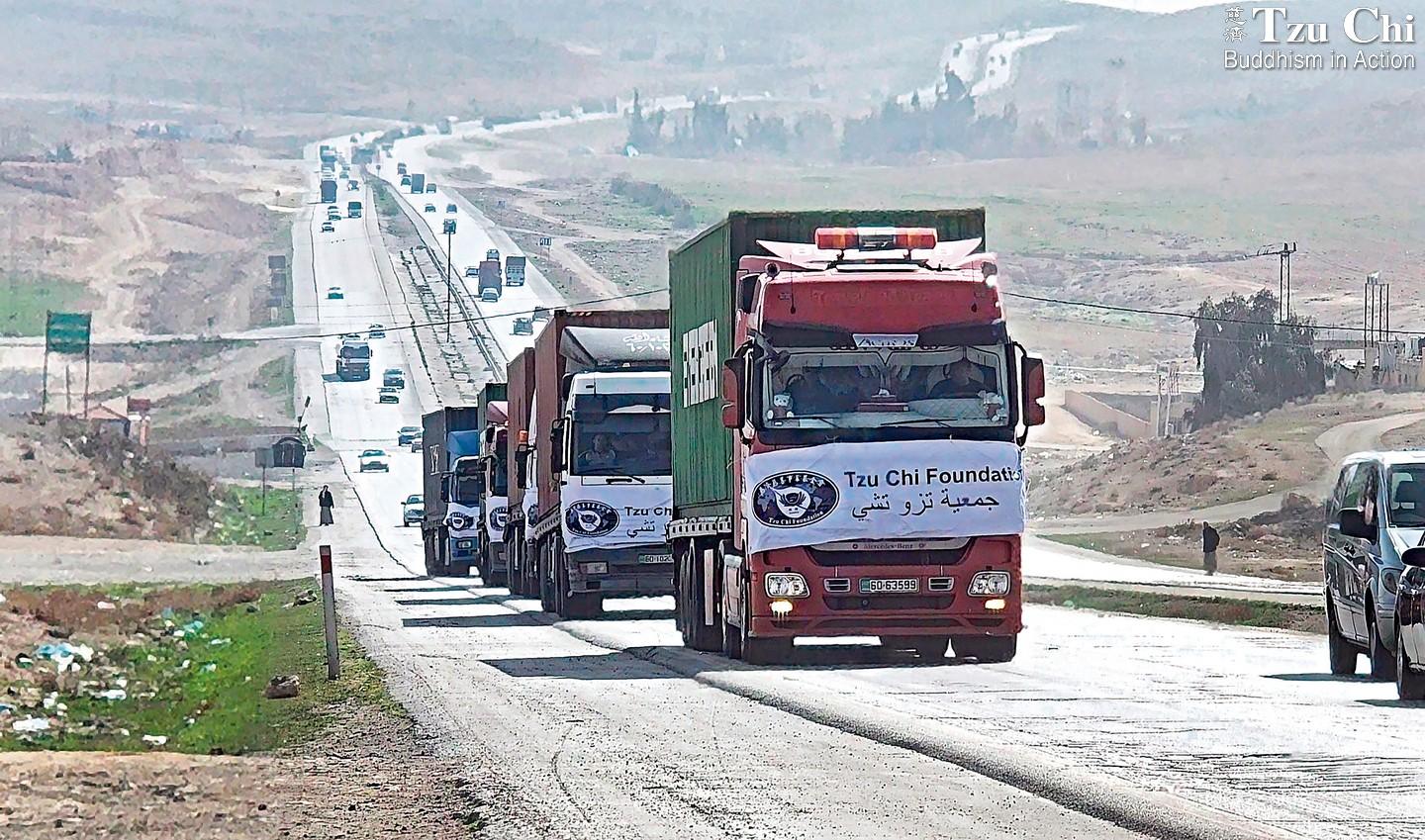
The banners hanging in front of the container trucks pictured here bear the name of the Tzu Chi Foundation in three languages—Chinese, English, and Arabic. These trucks are en route to a JHCO warehouse in Mafraq, northern Jordan. The goods in the trucks will be further transported by military trucks to the Syrian border.

